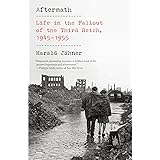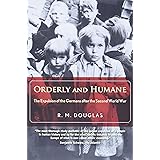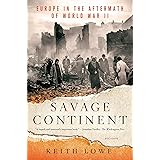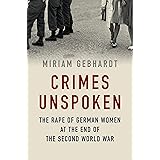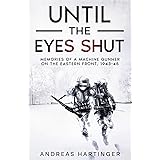




Download the free Kindle app and start reading Kindle books instantly on your smartphone, tablet, or computer - no Kindle device required.
Read instantly on your browser with Kindle for Web.
Using your mobile phone camera - scan the code below and download the Kindle app.

OK
After the Reich Hardcover – July 3, 2007
- Print length656 pages
- LanguageEnglish
- PublisherBasic Books
- Publication dateJuly 3, 2007
- Dimensions6.5 x 1.75 x 9.5 inches
- ISBN-100465003370
- ISBN-13978-0465003372
Books with Buzz
Discover the latest buzz-worthy books, from mysteries and romance to humor and nonfiction. Explore more
Similar items that may deliver to you quickly
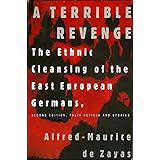 A Terrible Revenge: The Ethnic Cleansing of the East European GermansAlfred-Maurice De ZayasPaperback
A Terrible Revenge: The Ethnic Cleansing of the East European GermansAlfred-Maurice De ZayasPaperback
Editorial Reviews
From Publishers Weekly
Copyright © Reed Business Information, a division of Reed Elsevier Inc. All rights reserved.
From Booklist
About the Author
From The Washington Post
There's a gruesome last chapter to World War II, the bloodiest war in history. During the forced expulsions of about 12 million Germans from the Reich's eastern provinces, mostly from territory that became part of the newly reconstituted states of Poland and Czechoslovakia, about 2 million died. Imprisonment in former Nazi concentration camps, death marches, starvation, beatings, rapes and outright murder were all commonplace. As the Red Army and many local inhabitants saw it, this was justifiable revenge for Germany's monstrous crimes. The Americans, Brits and French didn't engage in violence on anything close to that scale, but they, too, sometimes let their desire for revenge get the better of them.
For a long time, this record of retribution was a taboo topic outside of Germany. Even the Germans worried that emphasizing their suffering could open them to accusations of rewriting history to cast themselves as equal victims. But since the collapse of communist regimes in their countries in 1989, at least some Poles and Czechs have been confronting that history. (Don't expect anything of the sort from Putin's Russia, where Stalin is glorified once again.) And in the West, this is a painful subject that has been attracting more attention.
In After the Reich, Giles MacDonogh, a British author of several books about German history, chronicles the final weeks of the war and the occupation that followed. His ambitious mission: to offer a comprehensive, unsparing account of what happened to the German people when the tables were turned. MacDonogh works to assemble a massive indictment of the victors, and his array of detail and individual stories is both impressive and exhausting. But he's far less successful in navigating the tricky moral terrain that such a subject inevitably occupies. As a result, his is a deeply flawed book.
It's misleading to talk about German suffering without referring to the Nazi record, but MacDonogh offers only the most perfunctory nods in that direction. "I make no excuses for the crimes the Nazis committed," he writes. What's troubling is his willingness to leave unchallenged some of the most dubious if understandable assertions of those Germans who suffered, his eagerness to trumpet any acts of brutality by Allied forces as the rule rather than the exception, and his propensity for highly questionable, sweeping generalizations.
MacDonogh informs us that 1.8 million German civilians had perished by the end of the war. Here, at least, one would expect a couple of comparisons that are glaringly absent: the death toll for the Soviet Union (an estimated 26 million, more than half of them civilians) and Poland (nearly 6 million, half of them Polish Jews). True, that's not the subject of his book, but some context is needed.
When a German woman expelled from Czech lands compares her people's plight to that of the Jews under the Nazis, MacDonogh offers no comment. Of course the expulsions were anything but the "orderly and humane" action promised by the Potsdam Agreement. That doesn't make them anything like the Holocaust. The well-documented cases of mass rape by Red Army soldiers -- incidentally, not just of Germans but also of women of many nationalities in "liberated" territories -- make for chilling reading. But MacDonogh seems eager to treat the incomparably less frequent cases of rape and torture by U.S. troops as evidence that they were almost equally vengeful.
There's more than a passing whiff of contemporary anti-Americanism in the casual way that he throws around terms such as "the inhumane approach" of the American victors toward the Germans. MacDonogh sees no contradiction in mentioning that the United States honored its promise to quickly release German POWs, or in both chastising the Americans for initiating a too-sweeping de-Nazification effort and then for not persistently nailing more Nazis. He off-handedly mentions the remarkable reconstruction of Germany -- the result of the most generous occupation policy the world had ever seen -- yet seems determined to emphasize everything that went awry. The Americans were too harsh or too soft, according to MacDonogh, but almost never right. The problem with After the Reich is that it gets so much of the big picture so wrong.
Copyright 2007, The Washington Post. All Rights Reserved.
Product details
- Publisher : Basic Books; First Edition (July 3, 2007)
- Language : English
- Hardcover : 656 pages
- ISBN-10 : 0465003370
- ISBN-13 : 978-0465003372
- Item Weight : 2.3 pounds
- Dimensions : 6.5 x 1.75 x 9.5 inches
- Best Sellers Rank: #516,063 in Books (See Top 100 in Books)
- #1,113 in German History (Books)
- #4,546 in World War II History (Books)
- #13,142 in World History (Books)
- Customer Reviews:
About the author

Giles MacDonogh is a British writer, historian and translator. His blog may be read on www.MacDonogh.co.uk
He has worked as a journalist most notably for the Financial Times (1988 - 2003), where he covered food, drink and a variety of other subjects. He has also contributed to most of the other important British newspapers, and is a regular contributor to the Times. As a historian, MacDonogh concentrates on central Europe, principally Germany.
He was educated at the City of London School and Balliol College, Oxford, where he read modern history. He later carried out historical research at the École pratique des hautes études in Paris.
MacDonogh is the author of fourteen books, chiefly about German history, but also on gastronomy and wine. In 1988 he won a Glenfiddich Special Award for his first book A Palate in Revolution (Robin Clark) and was short listed for the André Simon Award. His books have been translated into French, Italian, Spanish, German, Chinese, Slovakian, Russian, Bulgarian and Polish.
Writing in the Spectator Magazine, Graham Stewart said "Giles MacDonogh has repeatedly shown himself to be in the front rank of British scholars of German history. The depth of his human understanding, the judiciousness of his pickings from source material and the quality of his writing make this book at once gripping and grave. Graham Stewart, playing for high stakes, Spectator Magazine, 15 August 2009.
His latest book is The Great Battles (Quercus 2010).
Customer reviews
Customer Reviews, including Product Star Ratings help customers to learn more about the product and decide whether it is the right product for them.
To calculate the overall star rating and percentage breakdown by star, we don’t use a simple average. Instead, our system considers things like how recent a review is and if the reviewer bought the item on Amazon. It also analyzed reviews to verify trustworthiness.
Learn more how customers reviews work on Amazon-
Top reviews
Top reviews from the United States
There was a problem filtering reviews right now. Please try again later.
Before buying this book, I knew something about the mistreatment of German POWs by both the Western Allies and the Russians after the war. And from other reading I knew about the mistreatment of German civilians being expelled from the east of the country. But not until I read this book did I realize the sheer magnitude of the crimes committed against the innocent and the helpless, more so by the Soviets than by the West, but still in violation of international law, civilized norms and various agreements and protocols.
Most Western readers won't be shocked by the behavior of the Soviet communists given the way they treated their own people, but many will be surprised and disappointed to learn that in many important ways that the British, the French, and the Americans were sometimes just as bad and even more morally culpable than the Russians given the supposed Judeo-Christian moral underpinnings of their societies.
After the Reich looks at the good and bad in the ways each of the individual Allied countries ran their sectors in both Germany proper and in Austria. The reader learns of the incredibly vicious behavior toward German minorities residing in the east(at the sufferance of and possibly on behalf of and at the behest of Moscow) by the Czechs, the Poles, and the Yugoslavs in the immediate post-war years. Rape, wanton slaughter, senseless destruction, inhuman cruelty and ethnic cleansing of an unprecedented scale were the order of the day. And although the Western Allies eventually partially redeemed themselves and set Germany on the path to freedom and prosperity, the Russians never did.
Although Giles MacDonogh has added a very provocative sub-title "The Brutal History of the Allied Occupation" to the dustcover, After the Reich is actually a very well-researched, balanced, and thoughtful book. Lest anyone think that MacDonogh goes easy on the Nazis, he certainly does not. I came away from reading this excellent history with the reinforced opinion that no European nation or ethnic group had a monopoly on suffering during or after the war and none have even the right to claim primacy in victim status. Those who can read this without bias and separate the mass of the German people from the actions of their government may well come to the same conclusion.
This book is not for the faint hearted for two reasons: it is full of grusome details, and, more importantly, it may challenge all you have been led to believe.
I read the book in four nights so as not to lose the momentum of the story. At first I was put off by the endless pages of atrocities and wondered why MacDonogh has started out with them. I knew most of it anyway although a few of the stories moved me, such as the man who returned home at last, only to find the skeletons of his family hanging from the trees. But I realize in retrospect that MacDonogh was trying to create the feeling of Chaos, indeed the first part of the book is called such.
As MacDonogh moves on to describe life for the Germans in the individual national zones, a more concrete picture of the degree of insanity he is portraying begins to emerge. Every nation was in confusion and turmoil as reflected by the impossible situations in the camps. There seemed to be no way forward.
MacDonogh moves on to the the years of 1945-46 and the black markets and horrific winters that all, conqueror and conquered, had to endure. His inclusion of the attempt to reestablish arts is a welcome addition to knowledge of this time period, something I did not know.
The covering of the trials was a bit patchy and hard to follow, perhaps written by a different researcher. I enjoyed the ending and thought it brought a lot together. Concluding with the air lift and the establishment of the Cold War was the obvious place to end.
I am glad I bought and read this book along with other books on the subject. It is a story that has needs to be heard more often, lest we forget. It is not about anti-Americanism. And for those looking for context, did you not read the introduction? Indeed, you probably did not even read the book.
Patton was right, America fought the wrong enemy. There is so much more to the story that may never be made public. But this is as good a starting place as any.
The book benefitted me in several ways. To know someone is seeking the true story is always positive. I was interested to know more about Truman's and Churchill's participation and the information on Morganthau was new. This book does not try to avoid anyone's guilt, rather in seeking greater understanding of a fiendish, little understood, catastrophe in human history, it lets us all see a little more of ourselves. Most importantly, it enables us to analyze current events with a clearer knowledge of historical precedents. Thank you, Mr MacDonogh, for your efforts.
And thank you Amazon for allowing us, the average reader, an opportunity to share our thoughts publicly.
Top reviews from other countries
libro estremamente interessante per chi ama la storia e i processi che scatena la guerra. le atrocità patite dai tedeschi alla fine della guerra da part dei russi sono stati una vendetta ovvia dopo quello che i nazisti hanno fatto durante la loro invasione.
It's incredible we still have occupying troops in Europe and South Korea.
NATO should have been disbanded in 1991, when the Warsaw Pact ended, and Russia pulled
back 100% of its troops from Europe.
What an incredible $1 trillion waste of money, since then, for US taxpayers.
The money should have been spent in the US fixing our 3rd world infrastructure and schooling system.



